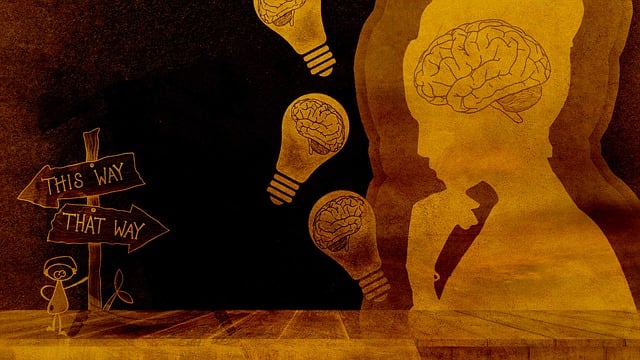Boulder's innovative approach to mental health addresses major life transitions with tailored therapies and community engagement, aiming to reduce stigma and improve access to care. Through initiatives like Risk Management Planning, Coping Skills Development, and educational outreach programs, Boulder Major Life Transitions Therapy fosters an accepting environment, empowering individuals to manage symptoms and navigate life changes with support, ultimately shifting societal attitudes towards mental illness.
Mental illness stigma is a pervasive barrier to treatment, yet efforts to reduce it are gaining momentum. This comprehensive article explores various strategies to combat stigma, focusing on Boulder’s innovative approach to integrating mental health support during major life transitions. We delve into the effectiveness of therapy and support groups in fostering understanding, as well as the pivotal role of community engagement and education in reshaping societal perceptions. By examining these multifaceted efforts, we aim to illuminate paths towards a more inclusive and supportive environment for those facing mental illness.
- Understanding the Impact of Stigma on Mental Health: A Comprehensive Overview
- Boulder's Approach to Addressing Major Life Transitions and Mental Illness
- Effective Strategies for Reducing Stigma in Therapy and Support Groups
- Community Engagement and Education: Empowering Change in Mental Illness Perception
Understanding the Impact of Stigma on Mental Health: A Comprehensive Overview

Stigma surrounding mental illness can have profound effects on an individual’s overall well-being and quality of life. It often prevents people from seeking help, leading to prolonged suffering and increased isolation. The impact is particularly significant during major life transitions, such as starting college, entering the workforce, or going through a divorce, when individuals may already be vulnerable. In these moments, the presence of stigma can exacerbate existing mental health challenges, making it even harder for people to navigate these changes successfully.
Understanding the nature and extent of this stigma is crucial in developing effective strategies for its reduction. Mental health professionals play a pivotal role here. Through initiatives like Risk Management Planning, they can foster an environment of openness and support. Additionally, promoting Coping Skills Development and producing engaging Mental Wellness Podcast Series can offer alternative resources, reaching a broader audience and providing valuable insights into managing mental health. By addressing stigma at these levels, Boulder-based therapy services contribute significantly to improving access to care and enhancing the overall mental wellness of individuals navigating major life transitions.
Boulder's Approach to Addressing Major Life Transitions and Mental Illness

In Boulder, a unique approach to addressing major life transitions and mental illness has gained prominence. This strategy recognizes that significant life changes, such as moving to a new city or losing a job, can significantly impact mental health, often exacerbating existing conditions or triggering new ones. Therefore, the focus is on providing comprehensive support during these pivotal moments. Boulder’s method involves integrating various therapeutic techniques tailored to individual needs. For instance, therapy sessions that encourage positive thinking and resilience help individuals navigate stress and uncertainty. Additionally, social skills training and self-awareness exercises are employed to foster connection, improve communication, and build a supportive network—all crucial elements in managing and overcoming mental health challenges.
This holistic approach ensures that Boulder residents dealing with mental illness receive the necessary tools and support to thrive during life transitions. By combining evidence-based practices with a deep understanding of the impact of major changes, this strategy aims to reduce the stigma associated with seeking help for mental health issues. As a result, individuals are empowered to openly discuss their struggles, seek timely intervention, and access the resources they need to lead fulfilling lives.
Effective Strategies for Reducing Stigma in Therapy and Support Groups

Reducing stigma in therapy settings and support groups is a powerful step towards fostering an accepting community for individuals facing mental health challenges. One effective strategy involves education and open dialogue. Therapists and group facilitators can play a pivotal role by providing accurate information about specific disorders, separating fact from fiction, and encouraging personal stories of recovery. This approach helps dispel myths and creates a safe space for vulnerable individuals to share their experiences.
Additionally, incorporating evidence-based practices like Mind Over Matter principles, Stress Management techniques, and Mindfulness Meditation can significantly contribute to stigma reduction. By teaching clients and group members practical tools to manage symptoms and improve overall well-being, these strategies empower individuals to take control of their mental health. Such positive experiences in therapeutic environments can lead to a more supportive societal attitude towards mental illness, especially when individuals successfully navigate major life transitions with the help of Boulder Major Life Transitions Therapy.
Community Engagement and Education: Empowering Change in Mental Illness Perception

In reducing the stigma surrounding mental illness, community engagement and education play a pivotal role in fostering change. By bringing awareness to the diverse experiences people face during major life transitions, we can humanize mental health conversations. Boulder’s vibrant community offers numerous opportunities for such initiatives. Local therapy centers and support groups can collaborate with schools, workplaces, and faith-based organizations through community outreach program implementation. These partnerships aim to educate individuals about the signs of mental illness, dispel myths, and promote empathy. Encouraging open dialogue and personal stories shared in a safe space helps normalize conversations around mental wellness.
Journaling exercises and workshops centered on mental wellness can be powerful tools during these engagement efforts. They provide individuals with guidance on processing emotions and experiences, fostering emotional intelligence. By participating in such activities, community members gain insights into their own emotional responses and those of others, contributing to a more compassionate understanding of mental illness. This collective shift in perception is essential for creating an environment where people feel supported rather than stigmatized during challenging life transitions.
Mental illness stigma reduction is a multifaceted approach, from understanding the profound impact on individuals and communities, to implementing effective strategies within therapy and support groups. The success of these efforts is further enhanced by community engagement and education, as evidenced by Boulder’s innovative program addressing major life transitions and mental illness. By fostering open dialogue and promoting understanding, we can create a more inclusive society that supports those facing mental health challenges, ultimately improving their quality of life.














